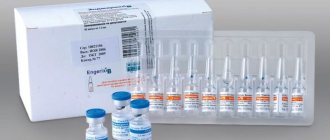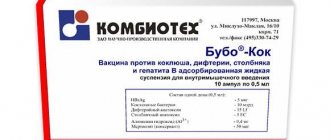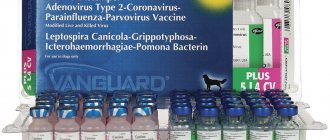"REGEVAK B" - a vaccine for the prevention of viral hepatitis B
Pneumococcal polysaccharide vaccine, conjugated, adsorbed, thirteen-valent
Manufacturer: JSC Binnopharm, Russia.
Protects against diseases: viral hepatitis B.
Applicable: for newborns, children (vaccine without preservatives), adolescents and adults.
Included in the national vaccination calendar.
Advantages of the REGEVAK V vaccine:
- A course of vaccination leads to the formation of specific antibodies to the hepatitis B virus in more than 90% of vaccinated people.
- Rare side effects.
- The vaccine version for children does not contain toxic preservatives.
Indications for vaccination with the Regevak B vaccine
Prevention of hepatitis B in children within the framework of the national schedule of preventive vaccinations and persons from groups at increased risk of infection with the hepatitis B virus:
children and adults in whose families there is a carrier of the HBs antigen or a patient with chronic hepatitis B;
Indications for use
- Healthy children and adults - for the prevention of infection and development of viral hepatitis B within the framework of the National Calendar of Preventive Vaccinations of the Russian Federation
- Children and adults at risk of contracting the hepatitis B virus (family contact with a carrier of the virus; those born from a mother who is a carrier of the virus; patients who have received a transfusion of blood or its components; patients with malignant blood diseases; workers of medical institutions, laboratories, students of medical universities and etc.)
health-conscious people Regevak® B hepatitis vaccine
Scheme and method of administration of the Regevak B vaccine
Vaccination against viral hepatitis B is given to all newborns in the first 24 hours of life.
Newborns from mothers at risk are vaccinated according to the 0-1-2-12 schedule (first dose - in the first 24 hours of life, second dose - at the age of 1 month, third dose - at the age of 2 months, fourth dose - at the age of 12 months) . Simultaneously with the first vaccination, it is recommended to inject human immunoglobulin against hepatitis B intramuscularly into the other thigh at a dose of 100 IU.
Children who have not received vaccinations under the age of 1 year and are not at risk, as well as adolescents and adults who have not been vaccinated before, are vaccinated according to the following scheme: 0-1-6 (1 dose at the start of vaccination, 2 doses after 1 year). a month after the 1st vaccination, 3rd dose - 6 months from the start of immunization.)
Vaccinations for persons who have had contact with material infected with the hepatitis B virus are carried out according to the 0-1-2 month schedule. Simultaneously with the first vaccination, it is recommended to administer intramuscularly (to another place) human immunoglobulin against hepatitis B at a dose of 100 IU (children under 10 years old) or 6-8 IU/kg (other ages).
The vaccine is administered to adolescents and adults intramuscularly into the deltoid muscle, and to newborns and young children intramuscularly into the upper outer surface of the mid-thigh. A single dose for newborns and persons up to 18 years of age inclusive is 0.5 ml. A single dose for adults over 19 years of age is 1 ml. Vaccination is carried out within the framework of the national calendar of preventive vaccinations.
Regevak B
Home \ Services \ Vaccination \ Vaccines \ Regevak B
The vaccine Regevak® B (BINNOPHARM CJSC / MTX CJSC Russia, Moscow) is intended for the prevention of hepatitis B. It contains the surface antigen of the hepatitis B virus (serotype AYW), obtained by DNA recombination in a yeast culture, transformed by inclusion in their genome gene encoding the surface antigen of the hepatitis B virus. A course of vaccination leads to the formation of specific antibodies to the hepatitis B virus in 90-95% of vaccinated individuals in a protective titer. The drug was obtained by genetic engineering and contains only the HBs antigen, which makes it possible to obtain high protective immunity.
Indications for use of Regevak® B
Prevention of hepatitis B:
- — in children within the framework of the national preventive vaccination calendar;
- - in persons from groups at increased risk of infection with the hepatitis B virus (children and adults in whose families there is a carrier of HBsAg or a patient with chronic hepatitis B; children in orphanages, orphanages and boarding schools; children and adults who regularly receive blood and its preparations, as well as those who are on hemodialysis and oncohematological patients);
- - in persons who have had contact with material infected with the hepatitis B virus;
- - for medical workers who have contact with the blood of patients;
- — for persons involved in the production of immunobiological preparations from donor and placental blood;
- — students of medical institutes and students of secondary medical educational institutions (primarily graduates);
- - in people who inject drugs.
In addition to the above categories, all other groups of the population should be vaccinated.
Method of use of the drug
The Regevak® B vaccine is available in ampoules of 0.5 ml - a child dose and in ampoules of 1.0 ml - a dose for persons over 19 years of age. The vaccine is fully prepared for administration. Injected with a sterile syringe. The opening of ampoules and the vaccination procedure are carried out in strict compliance with the rules of asepsis and antiseptics. The drug cannot be stored in an opened ampoule.
Method of administration of the Regevak® B vaccine: administered intramuscularly. In children, usually in the quadriceps femoris muscle (middle third of the thigh), and in adults in the deltoid muscle (shoulder). Injection into the buttock is not currently practiced. Subcutaneous administration is acceptable. Intravenous administration is strictly contraindicated.
Contraindications for use
- - severe reaction (temperature above 40°C, swelling, hyperemia more than 8 mm in diameter at the injection site) or complication to the previous administration of the hepatitis B vaccine;
- - acute infectious and non-infectious diseases, chronic diseases in the acute stage - immunization is carried out no earlier than 1 month after recovery (remission);
- - hypersensitivity to yeast and other components of the vaccine.
Adverse vaccine reactions
Adverse reactions to the Regevak® B vaccine are rare.
Local reactions: in 5-10% of cases - pain, redness and thickening at the injection site.
Systemic reactions: slight increase in temperature, complaints of malaise, weakness, nausea.
All reactions to the injection are weak and usually disappear 2-3 days after the injection.
Dosage and course of vaccination
The standard dose of Regevak® B vaccine for children is 10 mcg/0.5 ml, the dose for persons 19 years of age and older is 20 mcg/1 ml.
The standard regimen for administering the Regevak® B vaccine is 0-1-6, i.e. first administration, 1 month after the first administration, 6 months after the 1st administration. In this case, a protective antibody titer is developed 2 weeks after the second vaccination, and optimal and long-term immunity is formed a month after the third injection.
If faster development of immunity to the hepatitis B virus is required , or a person is at risk of infection, then the 0-1-2-12 (accelerated) scheme is used . The first injection is made, a month after the first injection, 2 months after the first injection, 12 months after the third injection (this dose is a booster dose to maintain immunity for a long time). A similar regimen is used in children born to HBs-positive mothers or who have had hepatitis B in the third trimester of pregnancy. When using this regimen, immunity is developed 2 weeks after the second dose of the vaccine, and optimal protection is formed a month after the third. Revaccination ensures the formation of long-term immunity.
If there is a need for immediate surgical intervention, the method of developing immunity to hepatitis B is to use a 0-7-21 day regimen in which the first injection is made, then on the seventh day from the first, then on the 21st day from the first injection. A protective antibody titer is developed a week after the third injection, but only in 60-70% of vaccinated people.
Scheduled vaccinations
According to the preventive vaccination calendar of the Russian Federation, children are vaccinated against hepatitis B in the first year of life.
- The first dose of Regevak® B vaccine is administered in the first 12 hours of life,
- second dose – at one month of age,
- the third - at 6 months.
The use of the Regevak® B vaccine is not clearly related to age. It is important to follow the vaccination schedule and timing. If the schedule is disrupted (the intervals between vaccine doses are significantly longer), then vaccination must be done again.
Planned revaccination after the completed regimen is carried out every 7-10 years under the control of the level of protective antibodies in the blood serum.
Use of Engerix B® in combination with other vaccines
The Regevak® B vaccine can be administered simultaneously with all drugs from the national schedule of preventive vaccinations on the same day, in different parts of the body, with the exception of the BCG vaccine.
The use of the Regevak® B vaccine together with other vaccinations does not affect their immunogenicity (ability to develop immunity). Tolerability of vaccines does not deteriorate, and the number of adverse reactions does not increase.
Administering several vaccines on the same day does not place an excessive burden on the immune system.
Regevak® B vaccine can be used to complete a course of vaccination started with other hepatitis B vaccines, as well as for revaccination if necessary. All vaccines in the national calendar are interchangeable.
Additional information about the drug
Vaccination should be postponed in persons with acute febrile conditions or exacerbation of chronic diseases.
Due to the long incubation period of hepatitis B, it is possible to have a latent infection with the hepatitis B virus during the course of vaccination. In such cases, the vaccine may not prevent hepatitis B disease.
Regevak® B vaccine protects only against hepatitis B and is not a means of preventing other liver diseases.
The Regevak® B vaccine is unlikely to have an effect on the ability to drive vehicles and operate machinery.
Contraindications
Only a doctor can decide whether Regevak B is suitable for a child to be vaccinated
"Regevac B" is contraindicated if there is a history of an allergic reaction to any component of the vaccine and in the following cases:
- Hypersensitivity to the active substances or to any excipients.
- Hypersensitivity to yeast and other components of the vaccine.
- Severe reaction (temperature above 40 C, edema, hyperemia more than 8 cm in diameter at the injection site) or complication to previous administration of the hepatitis B vaccine.
- Acute infectious and non-infectious diseases, chronic diseases in the acute stage - immunization is carried out no earlier than 1 month after recovery (remission). For mild forms of ARVI and acute intestinal infections, vaccinations can be carried out after the temperature has normalized.
- Pregnancy.
Vaccine Regevak B for adults 20 mcg/ml 1 ml suspension N10 1/10
Release form
Suspension for intramuscular administration
Package
10 ampoules of 1 ml.
pharmachologic effect
Regevak B is a vaccine for the prevention of hepatitis B. It contains the surface antigen of the hepatitis B virus (serotype ayw), obtained by DNA recombination in a yeast culture transformed by including in their genome the gene encoding the surface antigen of the hepatitis B virus.
A course of vaccination leads to the formation of specific antibodies to the hepatitis B virus in more than 90% of vaccinated individuals in a protective titer.
Indications
Prevention of hepatitis B in adults
Contraindications
Hypersensitivity to yeast and other components of the vaccine. A severe reaction (temperature above 40°C, edema, hyperemia more than 8 cm in diameter at the injection site) or a complication to the previous administration of the hepatitis B vaccine. Acute infectious and non-infectious diseases, chronic diseases in the acute stage - immunization is carried out no earlier than 1 month after recovery (remission). For mild forms of ARVI and acute intestinal infections, vaccinations can be carried out after the temperature has normalized.
Use during pregnancy and breastfeeding
The effect of the vaccine on the fetus has not been studied. Vaccination of a pregnant woman may be considered if the risk of infection is extremely high.
special instructions
Considering the possibility of developing immediate allergic reactions in particularly sensitive individuals, vaccinated persons must be provided with medical supervision for 30 minutes after vaccination. Vaccination sites must be provided with anti-shock therapy.
Complaints about the specific and physical properties of the drug should be sent to the State Research Institute for Standardization and Control of Medical Biological Preparations named after. L.A. Tarasevich (119002, Moscow, Sivtsev Vrazhek lane, 41, tel., fax (499) 241-92-38) and to ZAO Binnopharm (124460, Moscow, Zelenograd, 4th Western passage, 3, building 1. Tel/fax: (495) 510-32-88).
Increased reactogenicity of the drug and complications after its administration should be reported by telephone or telegraph to the Federal Service for Surveillance in the Sphere of Consumer Rights Protection and Human Welfare and to the State Research Institute for Standardization and Control of Medical Biological Preparations named after. L.A. Tarasevich.
Compound
1 ml contains: active substance - purified surface antigen of the hepatitis B virus (HBsAg) - 20 μg,
excipients: thiomersal (preservative) - 50 mcg (or does not contain), aluminum hydroxide (sorbent) - 0.5 mg; buffer components; water for injections up to 1 ml.
Directions for use and doses
The vaccine is administered intramuscularly into the deltoid muscle, in newborns and young children into the anterolateral surface of the thigh: administration to another site reduces the effectiveness of vaccination. Shake the ampoule before administration.
Side effects
Side effects with the Regevak B vaccine are rare. In 5-10% of cases, pain, erythema and induration may occur at the injection site. In response to the administration of the drug, the following are occasionally possible: a slight increase in temperature, complaints of malaise, weakness, joint pain, muscle pain, headache, dizziness, nausea, vomiting, abdominal pain.
All reactions to the injection are weak and usually disappear 2-3 days after the injection.
Considering the possibility of developing immediate allergic reactions in particularly sensitive individuals, vaccinated persons must be provided with medical supervision for 30 minutes after vaccination. Vaccination sites must be provided with anti-shock therapy.
Storage conditions
Store and transport in accordance with SP 3.3.2.1248-03 at a temperature of 2 to 8 ° C out of the reach of children. Short-term (no more than 72 hours) transportation is allowed at temperatures from 9 to 30°C. Freezing is not allowed.
Best before date
3 years.
Possible side effects
Side effects with the vaccine are rare. In 5-10% of cases, local reactions are possible in the form of pain, erythema and induration at the injection site. General reactions to the administration of the drug: slight increase in temperature, complaints of malaise, weakness, joint pain, muscle pain, headache, dizziness, nausea, vomiting, abdominal pain. It is possible to develop immediate allergic reactions requiring antishock therapy.
How to help your young child feel comfortable during vaccinations
Vaccination works better when the baby is calm and not afraid. To avoid scaring your child, try the following:
- Distract and calm your baby, hug him, talk softly to him
- Be calm, confident, smile.
- Maintain eye contact with your child
- Communicate with your child, show that you are nearby and everything is fine.
- Let your child hold a favorite toy or blanket.
- Ask your doctor if you can hold your baby on your lap and gently rub his back during vaccination.
- Be sure to praise your child after vaccination, tell him how great he is and how proud you are of him.
- Support your baby, even if he couldn't help but cry.



